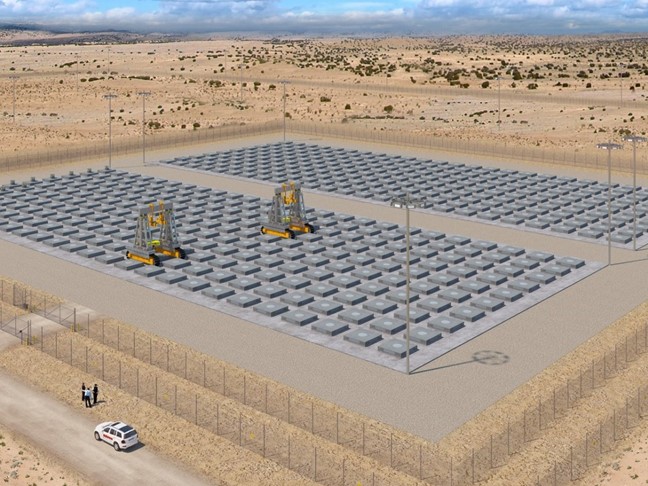Concept art of Holtec’s proposed HI-STORE CISF in New Mexico. (Image: Holtec)
Holtec International announced that it has petitioned the U.S. Supreme Court to overturn the Fifth Circuit’s March 2024 ruling that vacated the license for the company’s HI-STORE consolidated interim storage facility (CISF) for commercial spent nuclear fuel in southeastern New Mexico.
The announcement, made June 27, follows petitions by Interim Storage Partners (ISP) and the Nuclear Regulatory Commission to the Supreme Court to overturn an earlier decision by the 5th Circuit Court to vacate the license for ISP’s CISF in Andrews County, Texas.
“The NRC’s federally mandated authority and responsibility to license and regulate spent nuclear fuel is long established,” said Joy Russell, Holtec senior vice president and chief communications officer. “The construction of the CISF is a key part of future growth of nuclear energy and a vitally important part of our nation’s energy security. The Fifth Circuit’s ruling that the [NRC] was not authorized to license and regulate nuclear fuel storage is tantamount to calling OSHA unqualified for oversight of worker safety, FAA of aviation safety, and EPA for environmental safety. We urge the Supreme Court to overturn the Fifth Circuit’s legally unsound position.”
Holtec’s case: Holtec said it believes the Fifth Circuit Court’s decision contradicts several aspects of federal law, including the authorization of the NRC to license and regulate spent nuclear fuel storage facilities.
The company noted that a pertinent feature of the HI-STORE CISF is that it would have no impact on other local industrial activities such as fracking, drilling, and potash mining in the area. The company added that it is untrue to claim that other enterprises in the area, including oil and gas, potash, ranching, and farming will be adversely affected.
In challenging Holtec’s license before the 5th Circuit Court, Fasken Land and Minerals, an oil and gas industry group, and Permian Basin Land and Royalty Owners, an association of ranchers and oil companies, claimed the facility would disrupt industry in the area.


